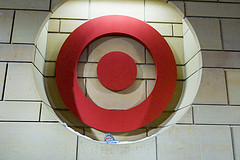Target's Price-Match Policy Not Suited To Paperless World

(smcgee)
Brick-and-mortar stores that match competitors’ prices generally don’t match prices from online merchants. They also won’t match the websites of their competitors down the street, or price-match their own websites. All of that is reasonable and well within their rights. But what happens in a paperless world, where the only evidence a customer has of that sale price is a circular delivered electronically? Reader Span_Wolf receives an electronic copy of the Best Buy circular every week. Getting a paper copy would require a trip to Best Buy or purchasing a Sunday newspaper. But this isn’t sufficient proof of the lower price for Target.
Best Buy had a product I was interested in on sale. It was listed in their weekly circular. The weekly ad that is sent out in paper form, via email to those that subscribe to the BB newsletter, and visible digitally right on their website when you click on the “Weekly Deals” button on the front page.
I decided to go to Target to pick up said item instead of Best Buy because I had a gift card to Target, the Target was much closer, and Target price matches. I offered them a print out of the page of the ad, to show them the web version of the ad on my phone, as well as pulling it up right there on their computer to show them the sale price on the Best Buy website. They declined to price match without an original print circular. I asked why and two different customer service agents said, “Policy.” I asked what exactly the policy was and they couldn’t describe it further. I asked them what difference it made considering it wasn’t a coupon but a sale price and what difference there is between the paper version and the carbon copy digital version visible on their website? After leaving the store I called up the support number and got the exact same response, and lack of clarification.
I did not have the print circular on hand, because I do not receive it in the mail, I get it emailed to me every week. It would be a pain to go get one because after the effort of driving to a Best Buy that’s much further way than the Target is, and then going back to the target to get the deal, I might as well save myself the extra effort and buy the item at Best Buy when I go there the first time.
I really just want to know what’s the point to the policy? I can understand not wanting photocopied coupons, or advertised deals via third party sites, but when I can give 3 different versions of the exact same ad, all directly from Best Buy, what reason does Target have to refuse me?
Want more consumer news? Visit our parent organization, Consumer Reports, for the latest on scams, recalls, and other consumer issues.

